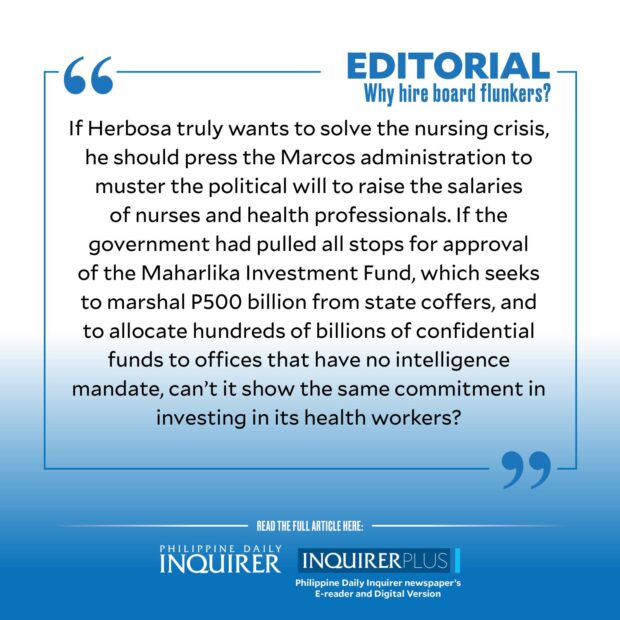
In his plan stated Monday last week, nursing graduates who failed to make the 75-percent passing score but got “almost passing” rates can be deployed to government facilities under a temporary license, with the same entry-level Salary Grade 15 equivalent to P36,619 a month. They will be working in a “limited capacity” and will have to be supervised by licensed nurses, he added.
Predictably, Herbosa’s wild idea was shot down by the two groups most affected by the issue: the Professional Regulation Commission (PRC) and the Filipino Nurses United (FNU), which represents nurses in both public and private sectors. Aside from affecting the integrity of board exams, the proposal raises legal, ethical, safety, and administrative problems.
PRC Commissioner Jose Cueto Jr. pointed out that there is no law allowing the issuance of temporary licenses to non-board passers. He said Republic Act No. 9173, or the Philippine Nursing Act of 2002, allows temporary permits but only for licensed nurses from other countries. At most, the Department of Health (DOH) secretary may give limited authorization to medical graduates during epidemics and national emergencies, Cueto said. He added that if such proposal were pursued, the DOH, PRC, and the Department of Labor and Employment would have to formulate its rules for implementation.
“Our consideration is patients’ safety and quality assurance. What kind of supervision, what kind of guidance [will be given to them]? Those are very important [issues],’’ Cueto said.
FNU president Eleanor Nolasco also noted the added burden to licensed nurses that this proposal would entail, which could drive even more nurses to seek jobs abroad. “How can you say that you appreciate registered nurses if you’re hiring non-registered nurses to take over their positions?” Nolasco asked.
Meanwhile, there are at least 18,000 nurses who passed the December 2022 nursing board exam and, in most probability, are still looking for a job, said FNU secretary general Jocelyn Andamo.
What this unfortunate development indicates is Herbosa’s inadequate grasp and appreciation of realities on the ground and the full picture of what ails the country’s health-care system. Knowing the correct statistics to make clinical and informed decisions would definitely help.
One of the lingering problems is understaffing in government facilities, with nurses hired on a job-order basis, a convenient but temporary arrangement that, in turn, discourages nurses from staying. According to the FNU, there are only 27,777 national plantilla positions for nurses, but of that number, 4,164 remain vacant as of November 2022. This, despite the fact that there are 172,589 nurses working in public and private hospitals in the country, and 124,999 more who are categorized by the DOH as having unspecified employment, meaning they are either unemployed, underemployed, or working in non-nursing jobs.
Why doesn’t the DOH tap these registered nurses instead of hiring those who have yet to earn a license to practice their profession? the nurses’ group asked. The DOH chief might need to immerse himself in the harsh realities inside overcrowded public hospitals and far-flung health centers to rid himself of his apparent disconnect to the dire effects that government policies have on the working conditions of nurses and other health-care personnel.
Did he miss what has been stated countless times about the root cause of the nursing shortage and that of other health professionals, which is their low salaries and dismal working conditions in both public and private hospitals?
With a starting monthly salary of P32,097 under the 2022 Salary Standardization Law for public nurses, and a heartbreaking P8,000 to P13,500 for private hospitals, how are these nurses expected to make a living? It is not even an issue of extolling their heroic role, but of looking into their basic survival.
If Herbosa truly wants to solve the nursing crisis, he should press the Marcos administration to muster the political will to raise the salaries of nurses and health professionals. If the government had pulled all stops for approval of the Maharlika Investment Fund, which seeks to marshal P500 billion from state coffers, and to allocate hundreds of billions of confidential funds to offices that have no intelligence mandate, can’t it show the same commitment in investing in its health workers? The legislature should similarly put its money where its mouth is, and enact laws posthaste that would address the need for better salaries for nurses and health care personnel.
In the meantime, Herbosa should devote his energy on crisis solutions rooted in established facts and figures, and abandon his pipe dream of hiring board flunkers. If this were a job interview, he’d probably get an “almost passing” rate of 70 to 74 percent.